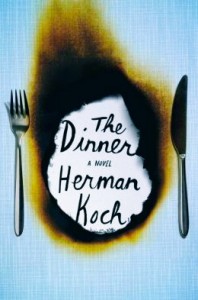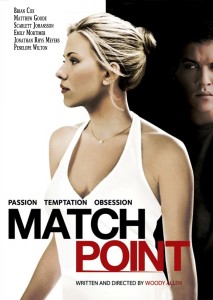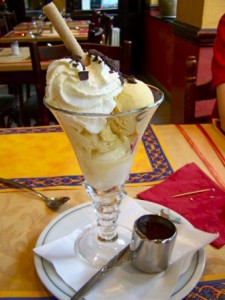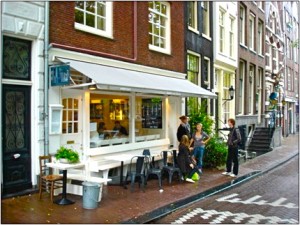“What would this evening have been like if, no more than an hour ago, I had simply waited downstairs until it was time to go, rather than climb the stairs to Michel’s room? What would the rest of our lives have been like? Would the smell of happiness I inhaled from my wife’s hair still have smelled only like happiness, and not, as it did now, like some distant memory?”
 This book by Dutch author Herman Koch has been sitting in my bookcase for almost a year. Occasionally, I have taken it out, when I have read enthusiastic reviews from people whose opinions I respect, but none of the reviews have said much about the action that occurs in this book, and I have always put it away, unread, thinking that the book was probably something like My Dinner with Andre. This week when I picked it up yet again, I opened it and began reading. Seventy-five pages later, I was fully engaged, reading with interest and some excitement, and thoroughly humiliated by my own willingness to jump to conclusions about a book that I had not given a fair chance. And the more I read, the more I understood why none of the reviewers whose reviews I have checked have much to say about the book’s plot: they can’t say anything without spoiling the story.
This book by Dutch author Herman Koch has been sitting in my bookcase for almost a year. Occasionally, I have taken it out, when I have read enthusiastic reviews from people whose opinions I respect, but none of the reviews have said much about the action that occurs in this book, and I have always put it away, unread, thinking that the book was probably something like My Dinner with Andre. This week when I picked it up yet again, I opened it and began reading. Seventy-five pages later, I was fully engaged, reading with interest and some excitement, and thoroughly humiliated by my own willingness to jump to conclusions about a book that I had not given a fair chance. And the more I read, the more I understood why none of the reviewers whose reviews I have checked have much to say about the book’s plot: they can’t say anything without spoiling the story.
The Dinner is a suspense novel, a study of families, an examination of the deepest hopes and dreams and despair of several members of the same family, a drama concerned with each person’s responsibilities to a wider society. Ultimately, it becomes a psychological thriller with an ending which the reader must supply for him/herself, based on his/her own background and beliefs about what is right vs. what is expedient. It is exciting at the same time that it can be depressing, and hard-hitting at the same time that it often feels contrived. I suspect that everyone who reads this book, however, will have something to share with others who have read it, and it may be the best Book Club book of the year, capable of inspiring intense discussion on many levels, but not necessarily uniform agreement about the conclusion and what it means.
Dividing the novel into sections named for the courses of a meal – Aperitif, Appetizer, Main Course, Dessert, and Digestif – the author matches the release of information to the pattern that restaurants follow in releasing food to diners, the story, like a dinner, increasing in interest as the meal becomes heavier and more intense.
Paul Lohman and his wife Claire plan to meet Paul’s brother Serge and his wife Babette at a local restaurant in Amsterdam, a place with pretensions to excellence and a long waiting list for reservations, characteristics which Paul, in particular, finds absurd. Serge is a politician with a high position in government, however, and aspirations to even higher office, and he thoroughly enjoys the perks of his position. He has, in fact, waited till the afternoon of the night on which he wanted reservations to call the restaurant. He has had no problem getting them, a point of pride for him. Both brothers have fifteen-year-old sons, and Michel (Paul’s son) and Rick (Serge’s son) are close friends, in addition to being cousins. Serge and Babette also have an adopted son, Beau, whom they adopted at a young age from Burkina Faso, and he, too, is often with the cousins.

Serge and Paul avoid the real issue by discussing this Woody Allen film starring Scarlett Johansson.
Author Koch builds the suspense by revealing information at an excruciatingly slow pace during the course of the dinner. During the “Aperitif” section, Paul, the narrator, thinks about something shocking he has found in Michel’s room, though he doesn’t usually pry, and though his discovery involves Rick, his nephew, he does not want to be the first to bring up any unpleasantness at dinner. Instead, as the novel moves on to the “Appetizer” section, the two brothers and their wives talk about films, something Paul regards as “a sign of weakness…something for the end of the evening, when you really don’t have much else to talk about.” Serge is particularly enamored of the films that Woody Allen has made with Scarlett Johansson, particularly “Match Point,” which has just come out. Paul thinks it is “pretty good,” while Serge finds it a “masterpiece,” a statement which immediately sets Paul to thinking of how he can prove that Serge has not understood the film. And when Serge is suddenly hungry and anxious to get his meal, “he reminded [Paul] of an animal that encounters an obstacle in its path: a bird that doesn’t understand that the glass in the windowpane is made of solid matter and flies into it again and again.” They are resentful of each other and tense about the matter regarding their sons, which they avoid discussing.

The Dame Blanche, the dessert chosen by the main characters in this novel, is a glorified Ice Cream Sundae with Chocolate Sauce
The Main Course comes while some of the dinner party is outside. One person has left the table, upset, and needs to regain control. Another is there to try to meet up with his son, who must retrieve something from his father before he meets his friends. It is at this point that the “Main Course” of information – the big problem – is revealed – very awkwardly: “This is what happened. These are the facts,” the author states, injecting himself into the narrative, and referring to flashbacks that disclose a serious crime in which Michel and Rick were involved three months ago. Though this part of the novel is the section upon which all the subsequent action hinges, the information as it is revealed feels contrived and implausible, and some readers may have difficulty believing the evolving complications. The backgrounds of additional family members suggest that some of the characters are not who they appear to be, and as they discuss the boys’ actions, some of them rationalize: “As long as nothing happens [re the police], nothing is happening.” As details emerge and the crisis regarding the boys escalates, the reader is further challenged to accept these events and their complications as natural outgrowths of the plot, instead of deliberate manipulation by the author.
The “Dessert,” shows that the main characters’ personal decisions regarding the future are varied enough to allow virtually any reader to agree with one or more characters regarding the future, one of the reasons this book is ideal for book clubs. Ultimately, the novel becomes a thriller, and though there are some unusual images and some sensitive writing, I, at least, was unable to get past the obvious presence of an author who made me feel as if he were trying to trick me. I don’t mind being tricked by mystery writers – in fact, the best ones do it successfully all the time, and I enjoy it – but the trickery in this one seemed clumsier than in other recent novels, and it kept me from identifying with the characters and their predicament, essential to great mystery writing.
Photos, in order: The author’s photo is from http://www.belfond.fr
A small Amsterdam restaurant, perhaps similar to that which the characters of this novel visited. http://www.letshavefuninamsterdam.com/
Match Point, one of three films in which Scarlett Johansson worked with Woody Allen, is one that is discussed over dinner in this book, a subject which allowed the brothers to avoid the read issue. http://jrhysmeyers.com
The Dame Blanche dessert, which some of the characters refuse to eat because it is “watery,” resembles a hot fudge sundaw, presented with more panache. http://www.stowers5.com/


